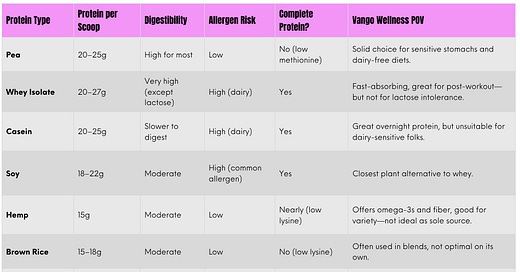To Hack or Not To Hack | Pea Protein Isolate
Pea Protein Isolate Explained: Pros, Cons, and How It Compares to Other Protein Powders
This Wednesday on our To Hack or Not to Hack series, we’re scooping into the increasingly popular world of pea protein isolate—a plant-based powder that’s taken up serious shelf space at your local smoothie bar and supplement aisle.
It’s marketed as a clean, allergy-friendly alternative to whey. High in protein. Easy to digest. Sustainable. Sounds like a win, right?
But for those of us (like me) who can’t do dairy or whey, the real question is: is pea protein actually better—or are we just trading one digestive battle for another?
Let’s get into it.
What Is Pea Protein Isolate, Exactly?
Pea protein isolate is made by extracting protein from yellow split peas—removing the starch and fiber to isolate just the protein content. It’s naturally vegan, gluten-free, soy-free, and dairy-free—making it a go-to for plant-based eaters and anyone with food sensitivities.
A typical serving provides 20–25 grams of protein and contains all nine essential amino acids, though it's slightly lower in methionine compared to animal-based sources.
Why It’s Trending
Pea protein isolate gained traction as more people moved toward plant-based diets—or needed alternatives to whey due to allergies, intolerances, or ethical reasons. It’s also become the backbone of many non-dairy protein blends and products like Ripple milk and Beyond Meat.
Its appeal? It's:
Hypoallergenic
Environmentally friendly
High in iron
Easy to blend
And doesn’t involve animal byproducts
Sounds ideal—until your stomach has something to say.
The Pros: What It Gets Right
Here’s what pea protein isolate does have going for it:
High in protein: Comparable to whey, making it solid for muscle support and recovery.
Good digestibility: Easier on the gut than whey for many people—especially if you’re lactose-intolerant or dairy-sensitive (🙋♀️).
Hypoallergenic: Free from dairy, gluten, soy, and nuts—making it versatile for those with multiple food sensitivities.
Sustainable: Peas require less water and fewer resources than dairy or animal-based proteins.
Naturally rich in iron: A win for vegans and menstruating women.
It’s also neutral in flavor, making it more versatile in smoothies, pancakes, or baking than, say, hemp or rice protein.
The Cons: What to Watch For
Pea protein isolate isn’t without its drawbacks:
Not a complete amino acid source on its own: It’s lower in methionine, which you’d want to pair with complementary proteins (like rice or quinoa) if you’re using it as your primary source.
May cause bloating or gas in sensitive individuals—especially if the brand isn’t well-filtered or if it contains added gums or fillers.
Can be gritty or chalky, depending on the formulation.
Heavy metal contamination has been found in some plant protein powders (always choose third-party tested brands).
More processed than whole foods—at the end of the day, it’s still a refined supplement.
And while it’s great for many, it’s not always easier to digest—some people still experience discomfort, especially when switching too fast or consuming it daily without variety.
How Does It Compare to Other Protein Powders? (Plant-Based and Animal-Based)
Whether you're choosing based on digestion, dietary restrictions, sustainability, or fitness goals, here’s how pea protein stacks up across the board:
Here’s how pea stacks up:
If you’re lactose-intolerant or allergic to whey (like me), pea protein isolate is a smart alternative—just be mindful of sourcing, ingredients, and how your body responds.
TO HACK or NOT TO HACK?
✔️ To Hack— if it aligns with your digestion, your values, and your plate.
Pea protein isolate is not a miracle, but it’s not a disaster either. It’s a solid, uncomplicated option for those who need a non-dairy protein source and want to support recovery without gut drama. But like any supplement, it’s only helpful if it works for your body.
At Vango Wellness, I believe in leading with real food—eggs, legumes, quinoa, fish, chicken, tofu—and using powders when they simplify your life, not complicate it. Pea protein can be part of that support system—but it shouldn’t be your entire plan (nor any protein powder for that matter).
If you’re looking for a protein powder that’s clean, gentle on digestion, and compatible with dairy-free living, pea protein isolate can be a helpful tool. But if it gives you bloating, fatigue, or discomfort—ditch it. Your body always casts the deciding vote.
Next Week on To Hack or Not to Hack
Red Light Therapy: Just a Glow or a Cellular Game Changer?
We’re flipping the switch on one of wellness’s most high-tech trends. Does it really boost collagen, accelerate recovery, and sharpen brain fog—or is it just expensive mood lighting?
Join the Vango Wellness Community!
💌 Subscribe to my newsletter for more wellness tips.
📲 Follow me on Instagram for daily motivation.
🎯 Book a FREE coaching consultation to start your personalized wellness journey.
🛒 Purchase the Supermarket Guide to help you make the right choices when grocery shopping.
Your daily rituals add up. Choose them wisely.





